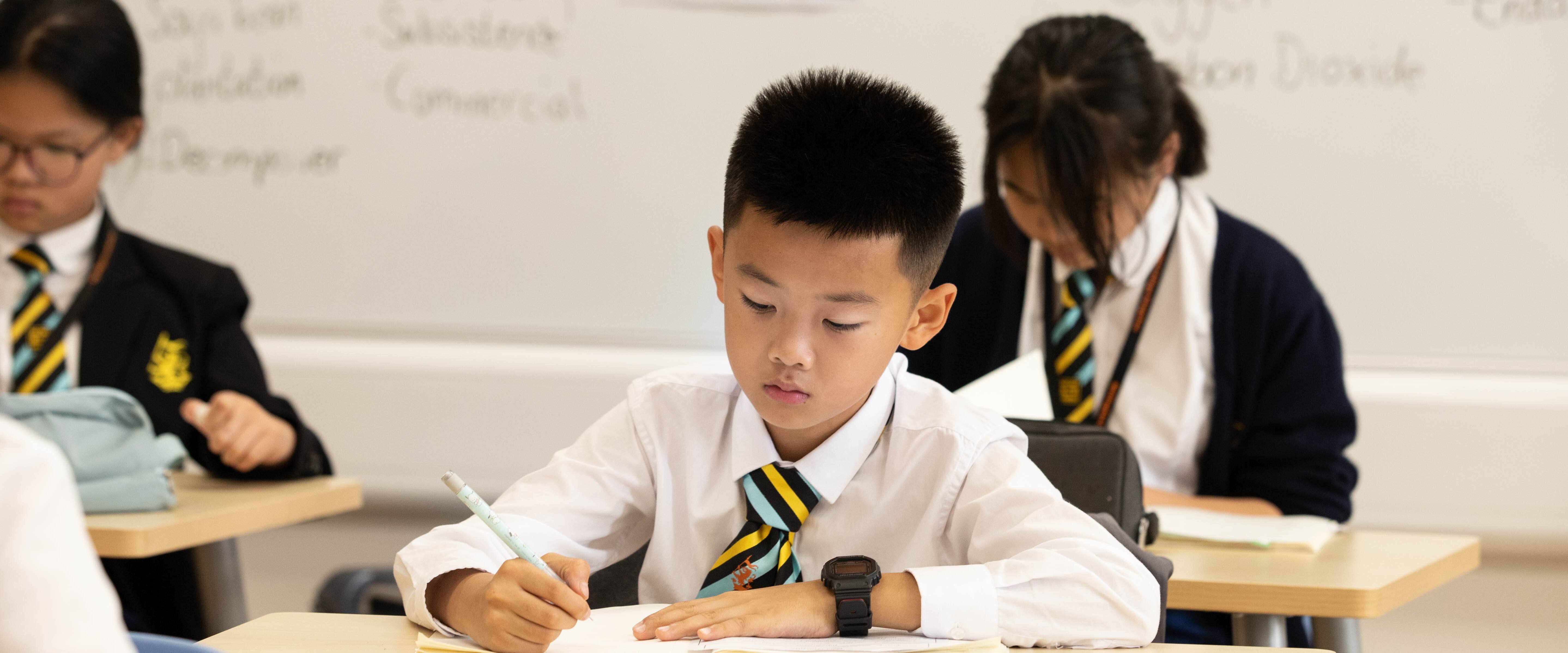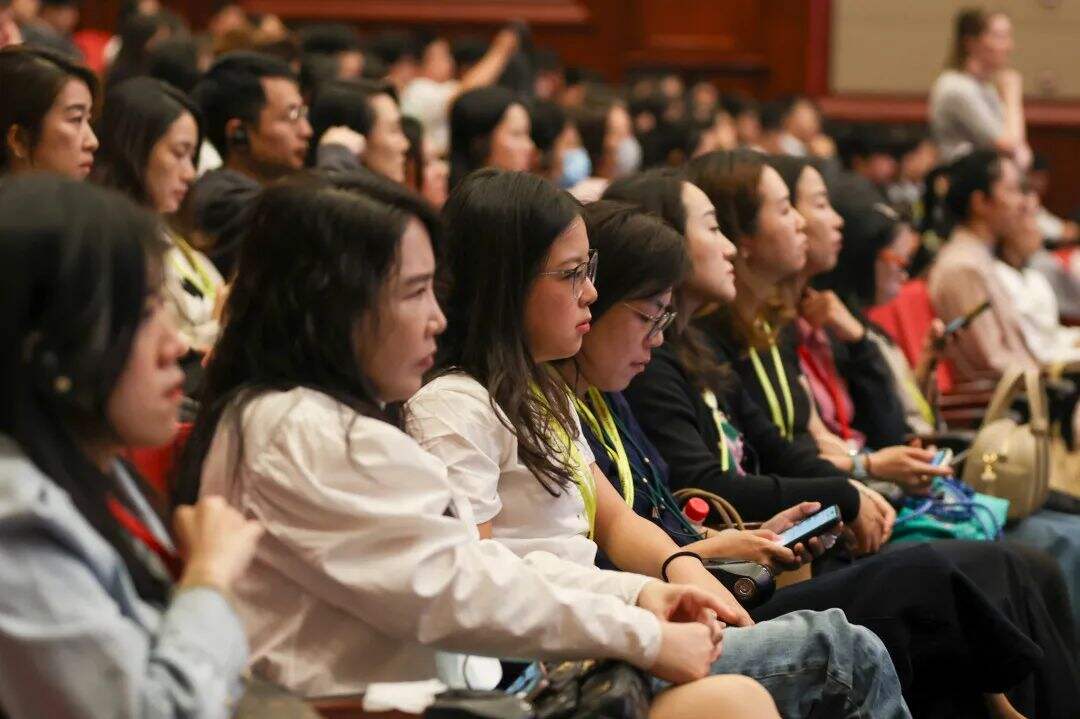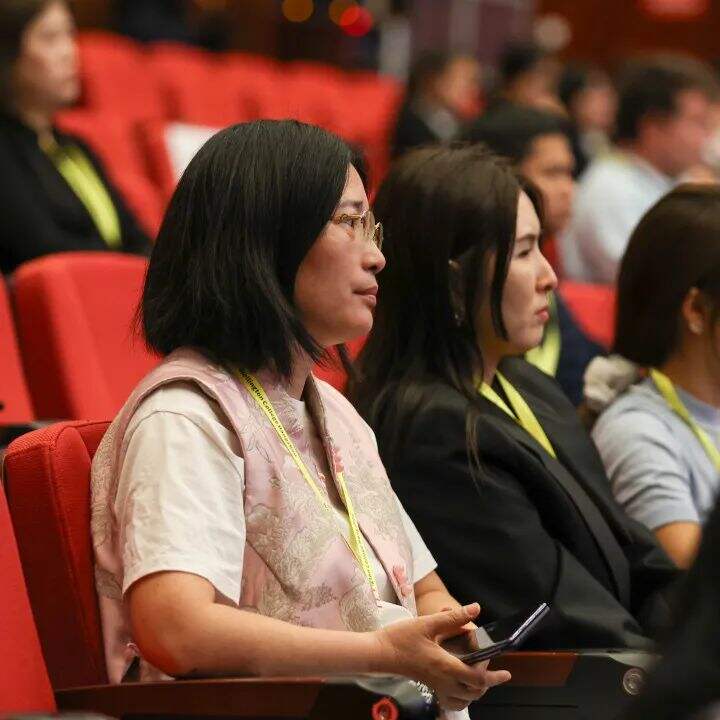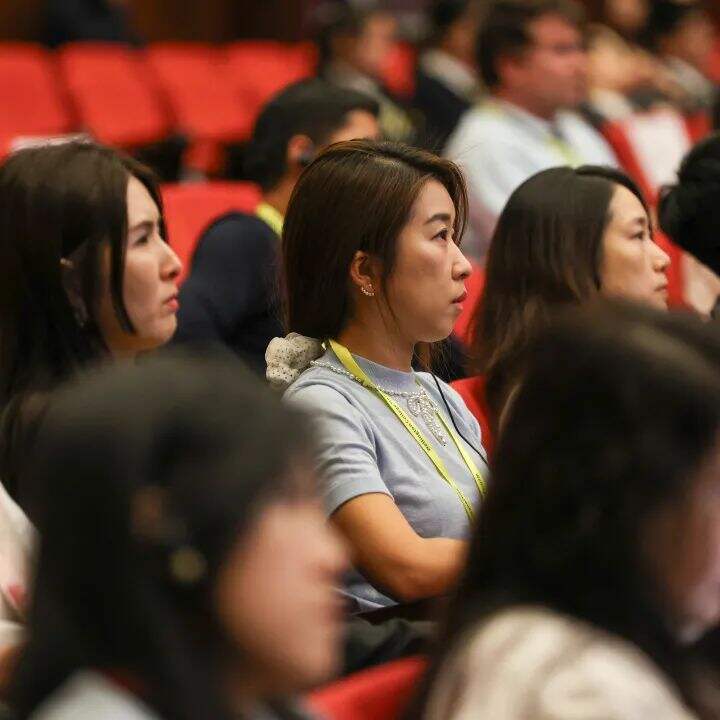

"I'm curious, how do universities prevent students from using ChatGPT to cheat?"
"We don't need to stop students at all."
What kind of educational philosophy is behind such an 'unexpected' answer?
Hangzhou, a city with the most profound history in Zhejiang Province, resonates with the University of Cambridge, one of the world's top universities with a history of more than eight centuries, when Professor David Cardwell, Pro-Vice-Chancellor and tenured Professor of Superconducting Engineering of the University of Cambridge, and a Fellow of the Royal Academy of Engineering, visited Wellington College Hangzhou on the afternoon of 23 October.
Professor Cardwell's visit aimed to increase the educational exchange between China and the UK and to cultivate more innovative international talents. He then provided a detailed overview of the application and admission process of the University of Cambridge and shared his insight on what type of talents the university is looking for.
Professor Cardwell's extensive experience in education and insightful perspective provided valuable guidance to the pupils on the quality and cultivation of innovative talents from a global perspective. Pupils were inspired to reflect on their own place in the future world and the ways to achieve continuous improvement.
This is an extraordinary school. You've got some fantastic resources here.
——Professor Cardwell
“I was deeply honoured to give Professor Cardwell a tour of our campus. It was a rare opportunity to meet in person with the Pro-Vice-Chancellor from one of the world's top universities. From his presentation and my discussion with him, I found out more about the University of Cambridge from a different perspective, and I learned that academic potential is what it looks for in its candidates, and the way teaching and sports systems run there. It has expanded my horizons and provided me with a clearer vision of what I need to strive for in the future.”
——Hanni,Head of College
Wellington College Hangzhou was a crucial stop on Professor Cardwell's trip to China.
“Wellington College Hangzhou is a hub where the most advanced British educational philosophy and practices join. Their distinctive problem-based learning and student-centred pedagogy provided a solid foundation for us to discuss the essential elements of educational success.” ——Professor Cardwell
Professor Cardwell shared the essential components of a ‘successful education’ and believed that quality education expands the horizons of pupils and sparks their creativity. He specifically noted that problem-based learning (PBL), a pedagogical approach that prioritises the pupils’ role in learning, is a highly effective method that can enhance pupils’ learning initiative through problem-solving and foster an extensive skill set of analysing and critical thinking.
“A teacher writes an equation on the board, teaches a pupil how to solve it, and then evaluates their performance – this is a traditional approach to teaching. In contrast, problem-based learning presents the problem instead of the solution, which pupils must come up with in groups with their peers. Keep trying and you will develop the ability to apply your technical knowledge to real-world tasks. This is how education makes innovation possible.”
As Professor Cardwell emphasised, beginning research at an early age is not what makes one an innovator. It is through education, continuous learning and acquiring the necessary knowledge and skills that one becomes more innovative.
Education plays a crucial role in fostering innovation. It's not the other way around where one becomes an innovator and then seeks education. The more knowledge you acquire through education, the better equipped you are to be an innovator. Therefore, education is essential in enabling and promoting innovation.
At Cambridge University, for example, half of the final year of each undergraduate course is usually research-intensive, which is dedicated to students' research. Therefore students should focus on acquiring the necessary skills in the earlier years which will enable them to become good researchers.
In addition, Professor Cardwell demonstrated the key points when applying to the University of Cambridge and other Russell Group Universities (RGUs). He reviewed the 2022 Cambridge application data and emphasised that besides the reputation and ranking, a greater factor in choosing a school is to evaluate how well the curriculum aligns with a pupil’s personal development needs.
What the University of Cambridge looks for the most during its admission process, according to Professor Cardwell in his presentation to pupils and parents at Wellington College Hangzhou, is a pupil’s enthusiasm for their chosen subject and academic research. No matter how much a student tries to perfect their personal statement, their passion for a specific field cannot be ‘pretended’, especially in front of experienced admissions officers at the university.
"There is often a culture among students around the world that getting first place in an exam is the most important thing. Grades are important, but a good education is about much more than coming first in every test."
It's important to listen to advice, ask yourself questions, and have a few "Plan B's." "Undergraduate education is just the beginning. The vast majority of students who apply to Cambridge do not receive an offer, but you can consider returning to Cambridge for postgraduate study as a 'Plan B', as many students are doing. If you are determined to get a Cambridge education, even if you don't succeed in your undergraduate application, there may still be opportunities in the future." 'he said.
He encouraged pupils to choose their subjects based on their interests and passions. In addition to submitting excellent academic performance, they should demonstrate their unique personalities and talents while applying and showcase their passion and unique understanding of their chosen subjects.
“If you apply to Cambridge, it should be because the programme we offer is the right fit for you. Many might reflect after today’s session and decide that Cambridge is not suited for them but Oxford or another university may be. It would be wise to make decisions based on this understanding,” said Prof. David Cardwell.
Following his presentation, Professor Cardwell and five pupil representatives from Wellington College Hangzhou engaged in an exciting panel discussion to explore such topics as artificial intelligence, future planning, career skills development, mental health, and how digital learning tools are integrated into teaching and learning at the University of Cambridge.
William, for example, talked about digital tools that are useful in recognising and strengthening weaknesses. He believes these tools are essential for learning and preparing for the future. Similarly, Rebecca spoke about her love of science and how important it is to conduct hands-on experiments. She feels that online learning cannot replicate the experience of being in a laboratory.
After that, William posed a particularly pointed question to Professor Cardwell: "I'm curious, how does the university prevent students from using ChatGPT to cheat?"
The professor's response surprised others in the room: "I don't think we need to stop them."
"ChatGPT is also a source of information," the professor explained. "It's a two-way street. ChatGPT can be used to generate content, but it can also help to identify the direction of content, to discover content that was not produced the user."
Professor Cardwell is very optimistic about the use of ChatGPT.
"For example, if a student submits ten articles online, but the eleventh article appears vastly different, we will be alerted. Therefore, during the oral examination, we will ask the student to discuss their essay in detail, but obviously, the student can't do that. Such a mechanism would make the learning process smarter."
Dora, on the other hand, felt that she was not yet old enough to make decisions about her future career path thoroughly. However, she hopes by the time she goes to university, she will have developed all the skills taught at Wellington College to enable her to make the right choice.
The pupils also discussed how digital learning has changed the education landscape, with Rebecca highlighting the use of homework submission websites for real-time online comments and corrections in WCCH. These websites offer convenience and accessibility for students. Similarly, Dora shared how search engines have replaced textbooks, and the results are instantaneous, making research and learning more accessible and efficient.
Hanni, Head of College, asked Professor Cardwell which aspect that you've noticed international students, especially Chinese students should work on, and how Cambridge University prepares students for the future in terms of soft skills like communication, cooperation, and independent learning. Professor Cardwell emphasised the importance of taking responsibility. He explained that the university does not spoon-feed students; instead, students are given the opportunity to learn from a well-defined curriculum delivered in a certain way. So ultimately, students must take responsibility and reap the benefits or suffer the consequences.
In this regard, Professor Cardwell's thoughts align with one of Wellington College Hangzhou's five core values: Responsibility. In our daily teaching and campus life, we strive to instil a strong sense of responsibility in pupils. We organise various initiatives to improve pupils’ social skills, collaboration skills, leadership abilities and other key competencies needed by 21st century talents. These attributes are also key qualities to help them transition into their future university studies.
Five pupils shared their unique perspectives, demonstrating their keen insight and self-assurance, and showcasing the exceptional quality of Wellington's student body. Not only do these pupils have clear plans for their future, but they are also proactive in exploring potential new professions- that do not yet exist! Their impressive performance left everyone in attendance eagerly anticipating the bright future of the next generation of pupils.
Professor Cardwell was impressed by the enthusiastic and positive mindset of our pupils. He encouraged them to pursue their dreams and to experience, experiment and innovate with courage.
Kathryn Richardson
Master of Wellington College Hangzhou
In today's educational environment, we must possess adaptability and be forward-thinking, prepared to readily accept change. With the visit of Professor Cardwell, he introduced to everyone what kind of qualifications and abilities are sought after by world-class institutions, discussing how pupils can adapt to the future needs of international society. It is hoped that pupils from Wellington College Hangzhou will reflect on the Professor's visit and keep his words in mind, as they strive towards self-improvement.
Ivey Wang
Principal of Wellington College Hangzhou
During his visit to our campus, Professor Cardwell gained a comprehensive understanding of our educational ethos, facilities and environment. He spoke highly of the academic atmosphere and open approach to education at our school. It was gratifying and reinforced our confidence in our ongoing efforts to promote the quality of our education. I hope that after this session, our pupils can learn from the University of Cambridge and the professor and realise a better version of themselves.



In retrospect, it was the imparting of knowledge and educational values that impressed our pupils and parents. Professor Cardwell's passion and unwavering dedication to educational excellence have planted seeds of hope in the hearts of every pupil at Wellington College Hangzhou, guiding them to realise their dreams in a wider world.